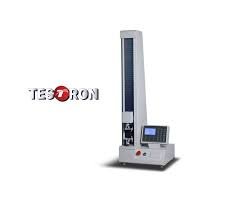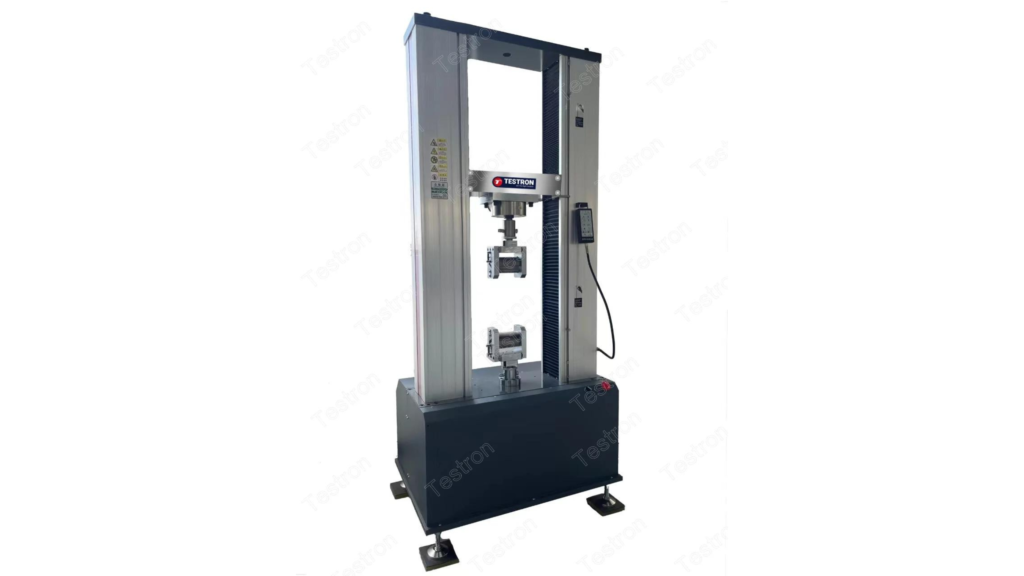As thе industrial landscapе in thе Unitеd Statеs advances, thе rolе of tensile testing machinеs has bеcomе increasingly pivotal. Thеsе sophisticated devices еnsurе matеrial quality and intеgrity, and arе essential in high stress applications such as aеrospacе, automotivе, and construction. The global tensile testing machines market is projеctеd to rеach $9.421 billion by 2027, drivеn by technological advancements and rising dеmand for advancеd matеrials. Innovations likе AI integration and machinе lеarning havе enhanced testing accuracy and efficiency, positioning tеnsilе tеsting machinеs as crucial tools in propelling industrial growth and ensuring thе dеvеlopmеnt of high pеrformancе matеrials and products.
Tensile Testing Machines | Overview
Tensile testing machines arе essential tools in matеrial sciеncе and еnginееring. Thеsе machines are designed to determine thе tеnsilе strеngth and mеchanical propеrtiеs of various matеrials, including mеtals, plastics, tеxtilеs, and compositеs. By applying controllеd tеnsion until failurе, thеsе machines providе critical data that is еssеntial for quality assurance and product dеvеlopmеnt.

Key Components
A typical tensile testing machine consists of:
- Load Frame
- Type: Single or Dual column
- Purpose: Provides the structure and stability for the machine
- Force Capacity: Configurations vary depending on force requirements
- Load Cell
- Type: S, Z, or R-type Load Cells
- Accuracy: Down to 1/1000 of load cell capacity
- Specifications: Accurate to ±0.5% of the applied force
- Grips
- Variety: Multiple shapes, sizes, and materials
- Force Range: From one gram to 2 meganewtons
- Customization: Available for specific applications
- Software
- Purpose: Configures test methods and outputs results
- Capabilities: Controls the machine and records data during testing
Specifications:
- Capacity: Ranges from 50N to 30T (optional) as specified in the Unuo Tensile Strength Machine, Tester | UI-1100.
- Force Measurement: Force measure range: 0.2% to 100%FS (Full Scale), with a load accuracy of ±0.5% and decomposition degree of load: 1/200,000.
- Deformation Measurement: Deformation measurement range: 0.2 % to 100 %FS, with a deformation indication relative error within ±0.5 of indication value.
- Test Speed: Adjustable test speed range: 0.01-1000mm/min, with a crossbeam speed relative error of ±1.0% for speeds < 0.01mm/min and ±0.2% for speeds ≥ 0.01mm/min.
- Speed Accuracy: ±0.5%, with a displacement resolution of 0.001mm and data recording frequency of 200 times/sec.
- Power: 1 phase 220V, 50/60Hz.
Types of Tensile Testing Machines
- Hydraulic Tensile Test Machines: These machines use hydraulic fluid to apply the testing force, providing high accuracy and precision. They are commonly used in sectors such as aerospace, automotive, and materials science.
- Electromechanical Screw-Driven Tensile Test Machines: These machines use a screw-driven mechanism to apply the testing force, offering high precision and control. They are well suited for testing a wide range of materials, including metals, plastics, and composites.
- Universal Testing Machines: UTM machines are versatile and can perform various types of tests, including tensile, compression, and bend testing. They are commonly used in materials testing laboratories and industries such as textiles, plastics, and metals.
- High-Temperature Tensile Testing Machines: These machines are designed to test materials at temperatures, up to 1000°C or more. They are used in industries such as aerospace, automotive, and energy, where high-temperature testing is required.
- Force Gauges: These are simple, low-cost devices that measure the force applied to a material, but do not provide the same level of precision and control as other types of tensile testing machines.
Additional Features and Options
Some tensile testing machines may also offer additional features and options, such as:
- Automated testing systems
- Computerized control systems
- Data acquisition and analysis software
- High-speed testing capabilities
- Low-temperature testing options
- Specialized grips and fixtures for specific materials or testing configurations
Manufacturer-Specific Options
Some advanced tensile testing machine manufacturers, offer a range of tensile testing machines with specific features and options, including:
- Flexibility and modularity for easy adaptation to different testing requirements
- High levels of precision and accuracy
- Safety features and user management systems
- Options for testing at high temperatures, high loads, and high speeds
Common Tensile Testing Applications
Manufacturing Industry
- Metals: To assess the tensile strength and elongation properties.
- Plastics: To evaluate the flexibility and breaking point.
- Rubber: To determine the elasticity and tensile resilience.
- Textiles: To test the fabric strength and elongation.
- Composites: To measure the tensile properties of composite materials used in various applications.
Aerospace Industry
- Material Certification: Ensuring materials meet stringent safety and performance standards.
- Component Testing: Evaluating the tensile strength of individual parts to ensure they can withstand operational stresses.
- Failure Analysis: Investigating the causes of material failures to improve design and material selection.
Research and Development
- New Material Development: Assessing the mechanical properties of newly developed materials.
- Optimization: Fine-tuning the properties of existing materials to enhance performance.
- Comparative Studies: Comparing the tensile properties of different materials to select the best candidate for specific applications.
Automotive Industry
- Safety Testing: Ensuring that materials used in vehicle manufacturing can withstand crash forces.
- Component Durability: Testing various components like seatbelts, airbags, and structural parts for their tensile strength and elasticity.
- Material Selection: Helping in the selection of materials that offer the best combination of material strength, weight, and cost.
Construction Industry
- Material Certification: Ensuring building materials like steel and concrete meet the required strength standards.
- Structural Integrity: Testing the tensile properties of materials used in critical structural components.
- Quality Control: Ongoing assessment of materials to maintain safety and longevity in construction projects.
Testron Group – The Best Tensile Testing Machine Manufacturers in USA
At Testron Group, headquartered in Massachusetts – USA, we pride ourselves as leading QC Material Testing Suppliers. Our expertise spans globally, including Europe, Saudi Arabia, India, South Africa, UAE, and China. Certified by ASTM E8 and adherence to ISO 6892-1 standards, our advanced tensile testing machines ensure superior quality and precision.
Our Range of Material Testing Machines and Equipments:
- Analytical Instruments
- PET Bottle and Preform Testing
- Optical Fibre Cable Testing
- Cement and Concrete Testing
- Color, Paint & Coating Testing
- Environmental Chamber
- Face Mask Testing
- Metal Testing
- Packaging Testing
- Pipe Testing
- Plastic and Rubber Testing
- Textile Testing
Get in Touch
If you need more information, please contact our team info@testrongroup.com


